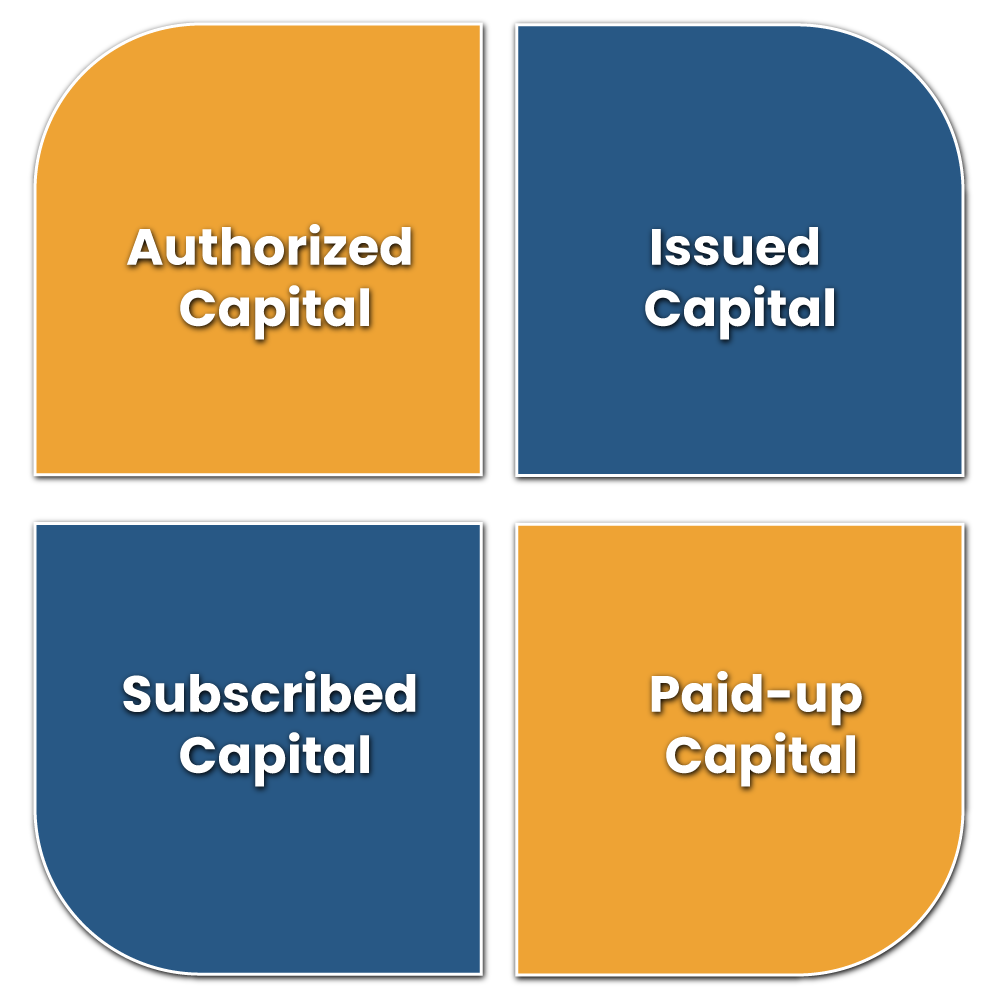The idea of commencing a new company attracts some fundamental questions such as: which business form is best for the business or how much Paid-up capital is required for company formation under existing bylaws. The startups and entrepreneurs sooner or later have to address these queries while incorporating the company.
Classification of Capital of Registered Entities in India
Lack of knowledge regarding the capital requirement can push any business owner into a state of confusion. If you are dealing with an identical situation then this blog is meant for you. This blog will brief you on everything regarding the classification of capital for the legally registered firm. The capital of a registered entity is classified into three categories mentioned below:-


Authorized Capital
The Authorized capital of the organization reflects the total amount that the organization can raise by the issuance of shares during registration & post-incorporation.
- The Authorized Capital is enlisted under the Capital Clause of Memorandum of Association of the organization.
- The company during its course of service life cannot raise capital by the issuance of shares surpassing the aforesaid amount.
- As mentioned above, a minimum amount of Rs 100,000 required to be secured as authorized capital for registering a privately-held company in India.
- The said capital can be further bifurcated into 10,000 shares of Rs 10 each.
The Company Act enables the registered company to increase its Authorized capital through a pre-determined procedure. The Authorized capital is deemed as a basic parameter for the estimation of the stamp duty or government fees for any application to be filed by the company. Henceforth, it is recommended not be secure higher authorized capital, as it is alterable.
Read our article:What is Cost of Company Registration in India?
Charges for Additional Authorized Capital
At present, the Ministry of Corporate Affairs[1], i.e., MCA charges a fee of INR 5,000 for the allotment of the minimum authorized capital of INR 1Lakh for the privately held institution. In case the company needs additional authorized capital, a fee relating to additional authorized capital shall be charged as per the following conditions:
- If the company wishes to elevate the additional share capital from Rs.1 lakh to Rs.5 lakh, Rs 4000/l0061kh will be charged as the allotment fee.
- Rs 3000 would be charged by the MCA in case if the company wants to raise the additional share capital from Rs.5 lakh to Rs.50 lakh.
- An amount of Rs 1000/lakh will be chargeable for increasing the additional share capital from Rs.50 lakh to Rs.1 crore.
- Rs 750/lakhs fees will be imposed on the private limited company that wants to increase the additional share capital from Rs.1 crore.
If the promoters of the privately-held company want to issue shares proportionate to the investment’s value in the company, prescribed fees would be imposed by the MCA for increasing the existing authorized capital of the company.
Issued Capital
During service life, an entity can procure capital from plenty of sources by the issuance of shares. The shares that are issued to provide for allotment and subscription are regarded as Issued Share capital of the company. The addressee of the said issue, be it person or entity, holds the right to subscribe to the shares.
It’s worth noting that the total amount of shares ‘to be’ issued & ‘already’ issued will not surpass the amount of Authorized Capital rendered under Capital Clause of MOA (filed while web-based Company registration or as amended afterward)
Subscribed Capital
The subscribed capital is a part of issued capital for which the company’s shareholders have to agree to contribute the amount. The shareholders are only entitled to the unpaid amount of capital on shares owned and subscribed.
Paid-up Capital
Paid-up capital is defined as the amount deposited to the company. The paid-up capital is equivalent to the amount paid by the shareholders in exchange for the share of stocks. The amount of paid capital procure by the company is reduced from the aggregate liability of the members.
The Companies Act has removed the criteria for the procurement of a minimum amount of paid-up capital. That means the registered companies would no longer be required to procure minimum paid-up capital to stay compliant with the Company Act. The promoters are allowed to invest the capital to ensure the seamless running of the company.
The amounts to be declared during the online registration process of a privately held entity are both paid-up capital as well as authorized capital. The company’s promoters shall mention the authorized capital as a minimum of 1 Lakh Rupees regardless of the amount related to the paid-up capital to be decided.
Historical aspect of the Paid-up Capital in a Private Company
Previously, there was a compulsion for the private companies to procure a minimum of Rs 10, 00,000 as a paid-up capital. But after analyzing that such a requirement was hindering the individual’s ability to establish a company, the MCA, in 2015, came up with a Companies (AMENDMENT) ACT, 2015 that get rid of this requirement. The step was taken to provide a seamless environment for all the business entities.
It was a welcome change as it allows entities to set up without procuring any minimum capital. It is vital to note that, after this amendment, Sections 2 (68) & 2 (71) continue to preserve the terms minimum paid-up share capital as may be prescribed”. Therefore, the Parliament of India has conferred the government a right to prescribe min. Capital requirements in the future.
Conclusion
At present, about 1.3 million companies were operational in India, out of which more 90% were working as a private limited entities. The amount of capital required to provide resilience to the company depends on the nature of operations and business. The paid-up capital plays a significant role in determining the ability of the company in terms of funding.
Keep in mind that the Companies Amendment Act, 2015 has to get rid of the provision regarding the minimum paid-up capital. However, the rules about authorized share capital still exist. Kindly head over to the CorpBiz helpdesk for any queries related to private limited company registration.
Read our article:Exciting Benefits of Private Company Registration That You Can’t Ignore!











